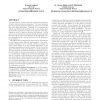Free Online Productivity Tools
i2Speak
i2Symbol
i2OCR
iTex2Img
iWeb2Print
iWeb2Shot
i2Type
iPdf2Split
iPdf2Merge
i2Bopomofo
i2Arabic
i2Style
i2Image
i2PDF
iLatex2Rtf
Sci2ools
104
click to vote
IMC
2006
ACM
2006
ACM
Rarest first and choke algorithms are enough
The performance of peer-to-peer file replication comes from its piece and peer selection strategies. Two such strategies have been introduced by the BitTorrent protocol: the rarest first and choke algorithms. Whereas it is commonly admitted that BitTorrent performs well, recent studies have proposed the replacement of the rarest first and choke algorithms in order to improve efficiency and fairness. In this paper, we use results from real experiments to advocate that the replacement of the rarest first and choke algorithms cannot be justified in the context of peer-to-peer file replication in the Internet. We instrumented a BitTorrent client and ran experiments on real torrents with different characteristics. Our experimental evaluation is peer oriented, instead of tracker oriented, which allows us to get detailed information on all exchanged messages and protocol events. We go beyond the mere observation of the good efficiency of both algorithms. We show that the rarest first...
| Added | 13 Jun 2010 |
| Updated | 13 Jun 2010 |
| Type | Conference |
| Year | 2006 |
| Where | IMC |
| Authors | Arnaud Legout, Guillaume Urvoy-Keller, Pietro Michiardi |
Comments (0)

